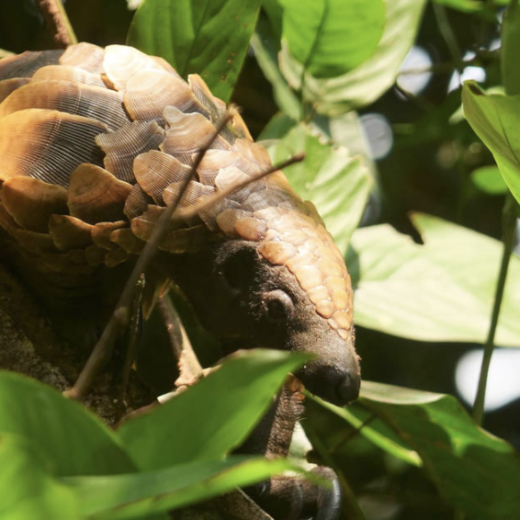
Press Release:
JUNE 27, 2020 (Bangkok, Thailand) – WildAid and Thairath TV, Thailand’s top television news channel, have joined together to highlight the links between wildlife and public health, and how to prevent future pandemics. They will host four episodes of the “Talks for Change” online show between June and September 2020.
From Ebola to SARS, to now the novel coronavirus (COVID-19), there is a long list of infectious diseases that have the capability to move from animals to humans. Studies show that 71 percent of all emerging infectious diseases in the past several decades originated from wild animals. Scientists expect there are others yet to emerge as wild habitats continue to shrink and we live in increasingly closer proximity to wildlife, which is why we must re-evaluate our distance with wildlife and adopt sustainable practices to prevent outbreaks like COVID-19.
The first episode of “Talks for Change” shined a light on the origin of zoonotic diseases and its connection to human behaviors in a discussion with Watcharabul ‘Note’ Leesuwan, a popular Thai actor with a passion for conservation from 10 years of photographing Thailand’s wildlife. He said, “In this time where society is practicing social distancing, we must apply similar concepts when it comes to wildlife. We need to take a step back, we need to stop destroying their habitats, stop hunting, buying, consuming, and owning wildlife as pets. At the same time, we need to increase our understanding of the importance of wildlife, and the impacts our activities and unreasonable demands can have on the environment.” Leesuwan will continue urging the public to say no to hunting, buying, owning, and consuming wildlife to prevent future pandemics as a WildAid campaign ambassador.
The first episode, which aired on June 25th, was hosted by Jomquan Lhaopett, Thairath’s top news anchor. The episode had over 51,000 viewers and reached over 15 million followers on Thairath TV’s Facebook and Thairath Online’s YouTube channels.
“It is Thairath TV and Thairath Online’s mission to be a leader in producing high-quality content on the issues most urgent to Thai society, such as news related to COVID-19,” said Vachara Vacharaphol, Chief Executive Officer, Thairath TV and Thairath Online. “Partnering with WildAid gives us the opportunity to help tackle future pandemics as we can leverage the strength of our online and social media platforms. The live talk sessions will help reflect on the past and help build a future where the new normal will be to protect wildlife, the environment, and public health.”
In an opinion survey by WWF in March 2020, 15 percent of survey respondents in Thailand claimed that they or someone they know had purchased wildlife products from an open wildlife market in the past 12 months while 90 percent of respondents would support a government-led closure of illegal and unregulated wildlife markets, and 79 percent believe that such actions would prevent similar pandemics from occurring in the future.
For 20 years, WildAid has been campaigning to end consumer demand for illegal wildlife products to save endangered species, which in turn can help protect human health. It is clear that conservation is now an issue of public health; the urgent need to protect wildlife is necessary to protect ourselves.
“We need to take pressing actions to ensure a pandemic like COVID-19 never happens again,” said John Baker, Chief Program Officer at WildAid. “We will draw on our strengths and work closely with partners in Asia and Africa to end the illegal wildlife trade. In Thailand, we will continue to work with government partners, media partners such as Thairath TV, and influential spokespeople to highlight the health risks associated with the wildlife trade. By working together, we have a better chance to address these risks effectively and protect public health.”
Each year zoonotic diseases are responsible for more than two billion cases of human illness and more than two million human deaths, according to a report from the Zoological Society of London and Hanoi School of Public Health. Experts from the Global Virome Project estimate that out of the 1.6 million potential viruses in mammals and birds, 700,000 could pose a risk to human health.
“Viruses take time to evolve and it can evolve to be resistant to vaccines and medicines,” said Parkpoom Dejhutsadin, Medical Technologist and a social media influencer who was also a guest on the first episode of “Talks for Change.” “If we continue to exploit the environment and expose ourselves to these viruses, in a matter of five to 10 years we could be facing another pandemic. Ebola, SARS, MERS, were all warnings that nature sent and we missed. This time we must listen, we must respect wildlife, its habitat, and laws put in place to help us live in harmony with each other.”
Stay in touch and get the latest WildAid updates.
SIGN UPAbout WildAid
WildAid is a non-profit organization with a mission to protect wildlife from illegal trade and other imminent threats. While most wildlife conservation groups focus on protecting animals from poaching, WildAid primarily works to reduce global consumption of wildlife products such as elephant ivory, rhino horn and shark fin soup. With an unrivaled portfolio of celebrity ambassadors and a global network of media partners, WildAid leverages more than $308 million in annual pro-bono media support with a simple message: When the Buying Stops, the Killing Can Too.
Journalists on deadline may email communications@wildaid.org
